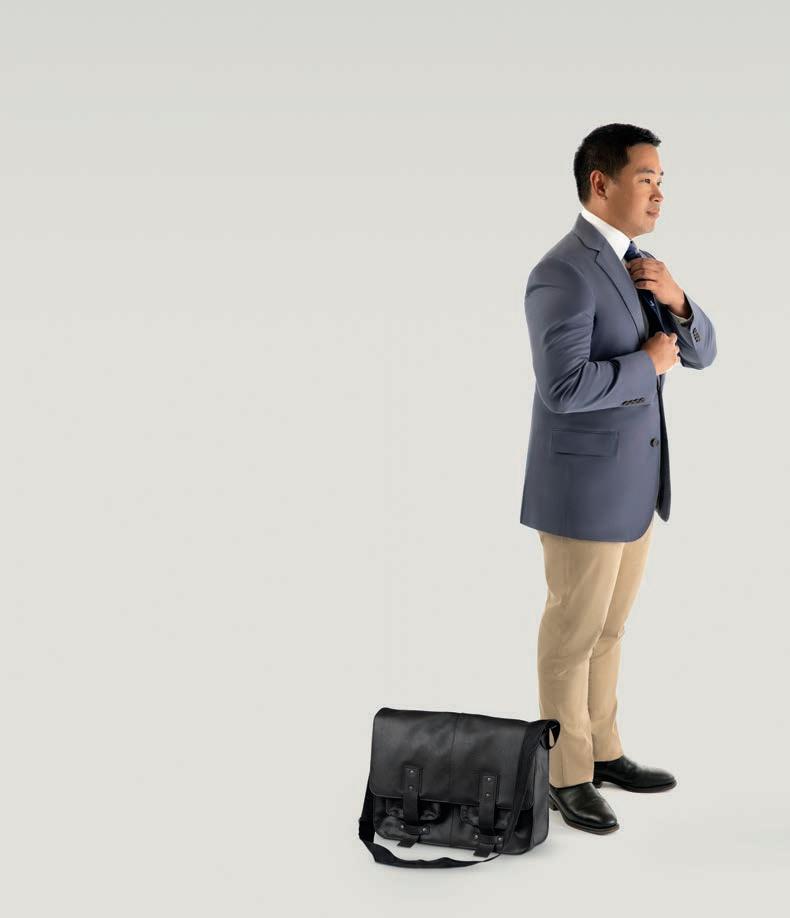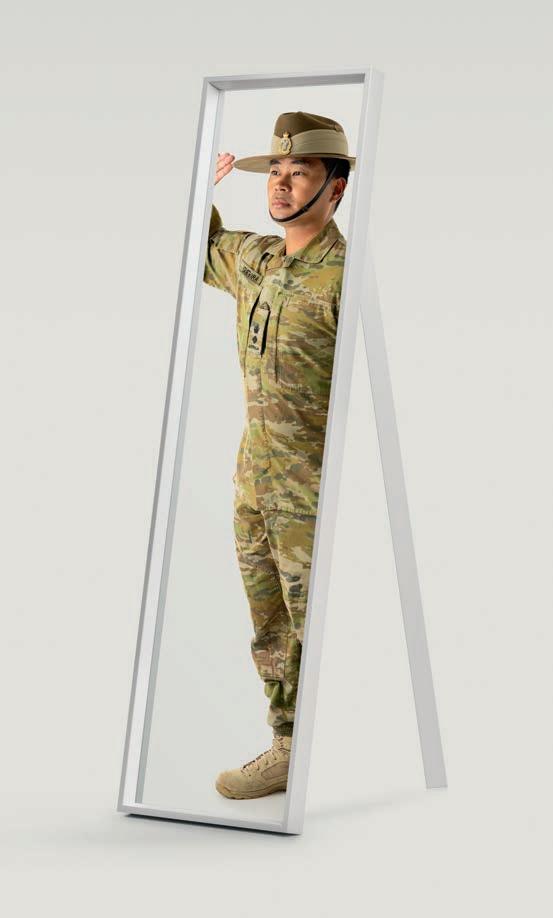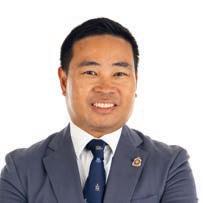
11 minute read
The perfect balance
by RSL NSW
Between the immersion and community of full-time service and the independence of civilian life are the Reserves. Four RSL NSW members provide their unique points of view on the Reservist experience.
Story Chris Sheedy
Many members of RSL NSW, whether they have served full-time in Defence or not, are also members of the Reserves.
It’s a career choice that enables the best of both worlds — the ability to forge a living and family life in the civilian sphere while also developing and keeping a powerful link to the Defence and veteran community.
Of course, the decision to join the Reserves is also one that ensures the individual’s sense of service to their country is fulfilled.
So, what is the experience of the Reserves really like? And what about its precursor, the Citizen Military Forces (CMF)? What is the value in being a Reservist, the satisfaction that keeps parttime servicepeople coming back year after year, and sometimes deploying for months at a time?
To find out, we spoke with four servicepeople at different stages of the Reservist or CMF journey.


As others who have served would know, very often you meet people from different places, with different backgrounds and from different walks of life when you join the Army Reserve, which is very enriching and rewarding. You meet people from so many different careers, professional environments and stages of life, and there’s one thing that is almost universally common between them: they are all the most down-toearth people I’ve ever met.
I’m a Lieutenant Colonel in the Army Reserve, and the Chief Financial Officer of the Australia/ New Zealand operations for a US multinational pharma company. For the Reserves, I generally do about 50 days a year.
I’m a Royal Australian Army Pay Corps Officer, currently posted to the Adjutant General’s branch of Army Headquarters. Members of our corps provide the capability to deploy financial advisers on operations, and we help to provide financial advice and assistance with governance and risk for the Army.
I joined the Reserves in 2007, after having been in the civilian workforce for five years. In my mid-20s, I was moved from an expat assignment in Singapore to a small factory in Gosford. I originally thought the business was trying to send me a message. They weren’t, and I had a great career with that business, but it made me want to experience other things.
One day I found an accounting magazine in the lunchroom of the factory. Inside was a story about an accountant who had joined the Reserves. It was just what I was looking for. Sixteen years later, I’m still in the Reserves and have had numerous fantastic experiences.
Five years ago, I received a phone call asking if I’d like to go to the Middle East for six months for Operation Accordion. My employer was very gracious and said yes. I was based at the main Australian logistics base in the Middle East. I was the financial adviser for Operation Accordion for six months, and it was a truly eye-opening experience which I shall never forget.
The Reserves has allowed me to experience a work life and a career outside of what I knew, without actually leaving my civilian work life. I wanted to keep a foot in the door of my civilian career. But professionally, it has been rewarding in that the Reserves gives me an experience of what it is like to do things outside the corporate environment.
It can be a juggle at times, depending on where you are in your civilian job, and the pressures of that job. But being in the Reserves is quite flexible.

I transitioned out at a time when career opportunities were quite limited. In the Defence health workforce, and beyond the rank of Commander, there were fewer opportunities to progress.
I felt that I was young enough to get out there and do something else. I also had three teenage boys who were in high school and had already been in seven di erent schools. I made a commitment to them to stabilise. So it was not an easy decision. It was really all about timing. But I didn’t want to stop serving.
The beauty about serving part-time is that you still get opportunities to reconnect. You just don’t get it day to day.
When you jump out into the workforce it’s exciting, but that sense of belonging draws you back. People in Defence have a real sense of service to their country and their community. You don’t see that everywhere, but it’s a common bond we share in the military. It’s an esteemed connection.
So, for me, being part-time is great. I get to reconnect with my friends. I get to be involved in what I consider to be important issues around the di erent regimes and how we might formulate an operational capability to defend our country. Most people don’t have the context to understand these issues, but when you’re in it, you get to be a part of it.
Being part-time is an absolute commitment. It’s a life outside your current life. It has challenges and new expectations. It’s like having a second job when you already have a full-time job.
Every year I’ve had di erent commitments and worked on some very cool projects. The first couple of years that I went into the part-time workforce, I supported the Directorate of Navy Health to establish a new branch called Navy Health Service O cers.
At the moment, I’m posted to a position as Sta O cer 1 within the Navy Health Services
Directorate. In Defence, it’s very hard to keep an operational specialist medical workforce because most of the people in Defence are healthy. But when we go on operations, we need specific technical skills. So, we have a parallel workforce in Navy Health to ensure a ready and deployable health element if we need to go on operations. I work within that structure.
Sometimes, the challenge in part-time is that those who are permanent don’t always have an appreciation of the extra stresses and obligations part-timers have in their civilian life. Because they haven’t lived that experience, it can be hard for them to contextualise those additional barriers and issues. That can be a frustration, but in terms of the value part-timers bring to the organisation, I think we are absolutely acknowledged.

Joining the Army was something I became interested in during the last couple years of school. But I thought it would be a good idea to go to university first.
So, I enlisted in the Sydney University Regiment in my first year of uni as a way of doing both, with a plan to go into the Regular Army once I finished.
I’ve spent enough time in Defence to see a huge change in attitude towards the Reserves from the early 2000s. Full-time Army sta would sometimes be posted to a Reserve unit and it was seen as a post that was not preferred. They had a chip on their shoulder. It usually took those members 6–12 months before they started to get their head around the Reserves and how it works.
There used to be a marked delineation between fulltimers and Reservists, but now there seems to be much more integration. When I deployed to Iraq in 2007, a couple of the drivers attached to our platoon were Reservists. That was the first time I saw Reservists and the Regular Army working together so closely.
I have seen this happening more over time; there has been a lot more integration into deployments. In recent years, we’ve seen some really good opportunities for Reservists to get deployments and do courses and get the same skills as fulltime personnel.
I think there’s now a lot more respect than there was. The attitude when I joined the Regular Army was very much that the Reserves don’t count, but I no longer see that attitude when we have full-time people come into the Reserves. There’s much better understanding between service types.
I would now recommend that any person who has separated from the Regular Army should give the Reserves a try. It’s not the same as being full-time, but it does in some way fill that hole.
There’s a similar camaraderie. There’s a community, and the big di erence is that it’s for three hours on a Tuesday night, rather than every living moment. But there’s still a common language, common jobs, common culture and a common understanding.
At the same time, it is a juggle. To have a life or a family is a juggle in the military either way. It can be tricky to have a full-time job and finish at 5pm on a Friday, be down at the unit at 7pm, work the whole weekend and be back in the o ce on Monday.
But you’re bonding throughout that; the other people around you are in the same position. It’s not easy in the Reserves and it’s not easy in the Regular Army, but you make those sacrifices. »
ALAN BARNES OAM, National Service, 1967 - 1969
President, Kingsgrove RSL sub-Branch Junior Vice-President, RSL Far Southern Metropolitan District
Twenty-four hours before I flew out of Vietnam, I was on a tactical area of responsibility patrol. I flew out that same day, and I had no way of telling my family I was coming home. I arrived back at Mascot and grabbed a cab, and the taxi driver asked where I’d been. I said, “Nui Dat,” and he said, “Where’s that?”, which I found very upsetting.
Ten days later, I was discharged from the Army, which was an unreal circumstance.
I can now understand what recent veterans go through. They can do multiple tours in Afghanistan, then come home and think, “It’s not that long ago that I was in a war zone, carrying a rifle and fearing for my life.”
With my transition back to civilian life, there was no help. You were in, then you were out. You were home, but you were still over there. And at that time, there were demonstrations and the anti-war movement was really taking hold.
My options had been to do National Service or spend two years in jail. World War II had only finished around 20 years previously, so we all knew a lot of people who had served. My mother and my father had served. It was part of your upbringing at the time, so o we went, as most of them thought it would be good for us to experience military life.
Six months after my number came out of the barrel, and after completing all my training in preparation to go to Vietnam as part of the reinforcements, the Army sent 70 of us down from Sydney to form the nucleus of the battalion, which was just being formed. We spent the next 12 months in Woodside. I was only left with five months to serve in Vietnam before my time was up.
Part of my motivation when I was called up was to see if I was up to it. So many of my peers had served in World War II, and I wanted to prove I could do it.
At the end of my time, I wanted to extend, but I was told I’d have to sign up for three years. I said if it was another six months I’d do it, but no way would I do three more years.
Now, when I look at Reserves, I have a very high level of respect for the fact that they give up their time. I think it’s terrific that they have the opportunity. Those who want to utilise the skills that Defence has given them.
While it’s di erent now, the fact is that people can get a lot out of the Reserves. It can be tough, but you’re serving your country. You have it on your record that you’ve served. That’s something that I’m still proud of — putting on the Australian uniform and serving our country.


